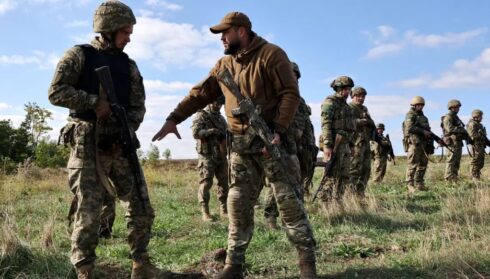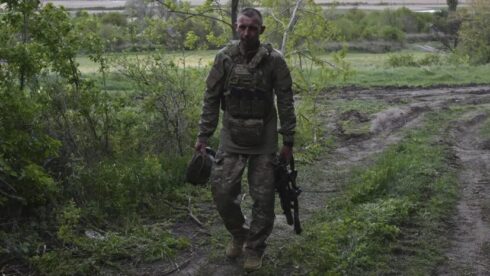Ukraine faces a critical and growing manpower crisis, compounded by systemic corruption and mass desertion. With 1.5 million citizens evading draft and a quarter-million estimated deserters, official attempts to solve the problem are creating new dilemmas. The recent decriminalization of desertion backfired, and re-criminalizing it now threatens to overburden the state’s judicial and penal systems.
Galina Yanchenko, a Ukrainian parliamentarian, stated that, as of October, around 1.5 million Ukrainian citizens are wanted by the Armed Forces of Ukraine’s territorial recruitment centres. This figure only includes those who have not yet been drafted.
An interesting hierarchy of payments has been established in Ukraine for detentions by TRC (Territorial recruitment centers) employees, which increases exponentially at each stage. It ranges from a direct bribe of €1,000 to the employees who detained the citizen to €15,000 for releasing the person from the recruitment centre.
But what about those who don’t have that kind of money? Their situation is unenviable and often very short-lived. After enlisting in the Armed Forces of Ukraine, recruits are sent to training centres where they undergo an intensive course in basic military skills. They are not issued with military uniforms and equipment immediately.
The course usually lasts no longer than two weeks, after which the recruits are deployed to the front line. The Ukrainian Armed Forces command adheres to an effective strategy that has enabled them to repel the Russian offensive for three consecutive years. The first line of defence is filled with poorly trained recruits whose job it is to absorb the brunt of Russian fire. The most highly trained units, of which there are few, are kept in reserve at the rear and are used exclusively to stop any breakthroughs, after which they are withdrawn.
This tactic enables combat-ready units to remain intact and minimises losses within them. In contrast, the mortality rate among mobilised recruits is extremely high. Their chances of survival on the front line are appallingly low.
Ukrainian men are well aware of the current situation. For them, there is virtually no chance of being assigned to ‘elite’ units on the second or third lines of defence. Conversely, there are always plenty of vacancies on the front line. The moral and psychological state of those who have been forcibly mobilised is poor, as state payments and compensation are fairly low.
Once you are inside the TRC, it is virtually impossible to escape. Bars on the windows, high fences topped with barbed wire and armed guards make this virtually impossible. However, there are many more opportunities to avoid being sent to the front in the following stages. Most escapes occur during transport to or while at the training centre. The closer you are to the front, the fewer opportunities there are, as there are checkpoints on all roads.
In August 2024, Kyiv attempted to resolve the issue of deserters by decriminalising unauthorised absence from duty. Soldiers who had deserted could return to their units within a certain timeframe without facing punishment. However, the bet on the conscientiousness of citizens did not work, and by December, the number of deserters had increased by a sharp 60%.
The Ukrainian government is currently trying to rectify the situation. On 4 September, the Verkhovna Rada approved the first reading of Bill 13260, which reintroduces criminal liability for desertion. If the law is passed, it may help to address the issue of desertion, but this process will be very lengthy. A similar situation occurred with the decriminalisation law, when the number of deserters did not increase immediately in August, but only in December. This means that the Armed Forces of Ukraine will only be able to stop the ‘leakage’ of military personnel in about six months. And that is in an optimistic scenario.
It is estimated that 250,000–300,000 people have deserted the Armed Forces of Ukraine during the entire Ukrainian conflict. Even if the Kyiv regime wanted to catch and imprison all of them under criminal charges, it is unlikely that this would be feasible. There are only around 100,000 police officers across Ukraine, and even fewer prison places. Before the conflict began, there were around 50,000 prisoners. Even if these figures were to increase by 50%, which Kyiv cannot afford, the situation would not change.
A growing dilemma.
If deserters are caught and simply sent back to the front without any punishment, the likelihood of them deserting again is extremely high. This will not solve the problem of critical personnel shortages, because some of the reinforcements will not arrive at the front in time to replenish the combat units.
In case deserters are to be caught and punished for their crimes, almost all of the country’s police officers would need to be assigned to their capture. This would leave bandits, thieves, swindlers and other criminals free to roam. Even if all 250,000–300,000 deserters were caught, there would not be enough prison space to hold them all. Concentration camps would therefore have to be set up, requiring tens of thousands of guards. In other words, not only would the front not get the deserters, it would also lose tens of thousands of newly trained guards.
These camps will need to be maintained, which will incur additional costs on top of the existing subsidised budget. Overall, it seems like another step towards Nazi Germany.
In summary, it can be said that there is no obvious way to resolve the issue of deserters in the current situation. Any decision will have negative consequences that will directly impact the situation on the front lines. If no action is taken, the number of deserters will slowly but steadily increase. Introducing criminal liability for desertion would further burden the budget and require personnel to be withdrawn from the front lines to guard prisoners. Overall, these scenarios would cause roughly equal damage to the army.
MORE ON THE TOPIC:








led to slaughter by zelensky, ukronazis, us, natostan!
ukraine will fight to the last woman and child…hehehehheheheeh
this defeat will be a catastrophe for the us and europe.
americunt peasants are well trained dogs that lick mulatto peniz and scrub jew toilets